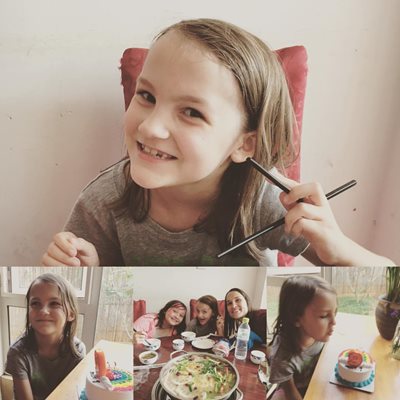Hallie tenía solo 10 meses cuando comenzó a tener convulsiones. Su madre, Kelly McKeithen, recuerda haberse dado cuenta de ello por primera vez cuando comenzaron a salirle los dientes.
“No me di cuenta de inmediato de que eran convulsiones”, señala. “Dejaba de moverse y se quedaba mirando un punto fijo durante algunos segundos mientras movía ligeramente la mandíbula”. Primero, McKeithen pensó que a Hallie le picaban las encías. No fue hasta que los episodios comenzaron a suceder con más frecuencia que McKeithen y su marido sospecharon que la causa del comportamiento eran convulsiones.
Los McKeithen viven en China por trabajo y llamaron a un amigo enfermero pediátrico para pedirle asesoramiento. El enfermero les recomendó buscar atención pediátrica de inmediato, ya que las convulsiones a menudo están asociadas con tumores cerebrales.
Los McKeithen viajaron al centro pediátrico más cercano en Bangkok, donde a Hallie le realizaron un estudio de MRI (imágenes por resonancia magnética) y le diagnosticaron FCD (displasia cortical focal). La familia McKeithen pasó un mes allí probando distintos medicamentos y tratamientos.
“Los medicamentos funcionaban durante algunos días y luego las convulsiones volvían a aparecer”, explica McKeithen.
Luego los refirieron al
Instituto del Cerebro de Nicklaus Children’s Hospital, líder en el tratamiento de la epilepsia pediátrica. “Nos refirieron a una enfermera muy especial, Patricia ‘Pat’ Dean. Nos comunicábamos por correo electrónico y estábamos en contacto permanente con ella. Nos enviaron de vuelta a China con una combinación de medicamentos para las convulsiones. “Hallie estaba sufriendo entre seis y trece convulsiones al día, y cada vez empeoraban más”, continúa McKeithen. En ese momento, Hallie experimentaba convulsiones tonicoclónicas generalizadas devastadoras, casi no podía caminar y necesitaba atención constante”.
Cuando Hallie tenía 18 meses, los McKeithen viajaron a Miami para conocer al equipo del Instituto del Cerebro de Nicklaus Children’s Hospital.
“Apenas llegamos, conocer a todos los médicos fue revelador, tranquilizador e incomparable”, relata McKeithen. “Nos transmitieron un sentimiento de esperanza que fue muy reconfortante. Sabíamos que estábamos en excelentes manos”.
El Dr. Ian Miller, neurólogo pediátrico, el Dr. Sanjiv Bhatia, neurocirujano pediátrico, y Pat Dean, enfermera profesional, formaban parte del equipo multidisciplinario que, de manera conjunta, diseñó un plan de cuidados para Hallie.
“Recuerdo pensar en lo difícil que debe haberles resultado vivir tan lejos y tener que atravesar todo esto con su pequeña”, describe Pat. “Su fe realmente los ayudó, pero sabía que necesitaban esperanza para su hija. Me mantuve en constante comunicación con ellos y seguí el caso hasta que pudieron viajar a Miami. Era lo menos que podía hacer”, señala.
En enero de 2009, el equipo multidisciplinario de Nicklaus Children’s Hospital recomendó que Hallie se sometiera a un cirugía en dos etapas para recopilar más información sobre una lesión en el lóbulo temporal, área que afecta los nervios de la boca. Esta cirugía especializada consistía en la implantación de electrodos en el lóbulo temporal para recopilar información sobre la causa de las convulsiones. Hallie tuvo una convulsión en la mesa de operaciones, así que el equipo pudo determinar el área precisa del tumor y el procedimiento se completó en una sola etapa.
“Pensamos muy bien en lo que hacemos y, a veces, podemos tomar otra línea de acción. En el caso de Hallie, tuvimos la suerte de tener que operarla solo una vez”, explica Pat.
“Cuando Hallie salió de la cirugía, era otro bebé”, describe McKeithen. “Estamos felices de poder decir que Hallie no tuvo efectos secundarios de la cirugía y que se le disminuyeron progresivamente sus medicamentos. Desde entonces no ha tenido más convulsiones ni ha tomado más medicamentos”.
Hallie, que ahora es una animada niña de 9 años, es una inspiración para las familias con hijos que tienen convulsiones epilépticas y los McKeithen esperan que la historia de su hija sea un mensaje de esperanza para los demás.
